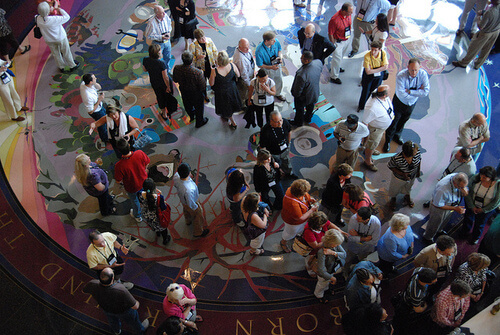
Image courtesy to Joe Ross
When using events to build your career, what comes to mind? Career fairs? These shindigs usually entail dressing up in your nicest (aka, most uncomfortable) outfit, and awkwardly stopping by each booth for an impromptu interview with recruiters.
In today’s connected world, career fairs are no longer the only events that are your ticket to building a stronger career. Whether you’re a student, a seasoned professional looking for a new job, or an entrepreneur, events are one of the strongest tools to advance your career. As the saying goes, “It’s not what you know, it’s who you know.”
Technically, it’s a little bit of both. Events allow you to expand the number of people who you know, by flexing what you know.
How do you show what you know at events? By doing not telling. Events can be your platform to let your knowledge and skills do the talking for you, while simultaneously contributing to a cause or topic of importance to you.
You can leverage events to expand your network and showcase your skills and knowledge in many different ways:
- Attending
- Volunteering
- Speaking
- Organizing
Attending Events
Attending events, while usually the most financially expensive option regarding getting involved in events, is the least expensive option, time-wise.
Some of the benefits of attending events include:
- Networking: Many people claim to dislike networking, insisting that it feels awkward and forced. This is understandable. However, if it feels this way to them, there’s a good chance they’re approaching it the wrong way. Instead of looking at it as who you can meet at an event and sweating about how you present yourself, go into the event with the goal of learning something new from each person you meet, and figuring out how you can help them with some of their challenges. If you meet other professionals you would like to follow up with, ask for their business card and reach out to them after the event. Even better, if the event is using the Whova event app, you’re in luck: Whova’s technology enables you to browse the attendee list beforehand, make note of who you want to meet, and even message them before the event.
- Certification and Workshops: Many technical events offer some sort of training or certification. You can use these events to meet others with similar or related skills, obtain the certificates, and show them off even after the event.
- They’re fun: The central goal of most events is to entertain and educate those who attend. Don’t forget to immerse yourself into all that each event as to offer. If possible look at the program online or in-app before the event, and make a plan for the portions of each event that are a must for you to attend.
Volunteering for Events
If you’re looking to dig deeper into events and get your hands dirty, consider becoming a volunteer.
Why would you want to volunteer at an event? Here are a few great reasons:
- Build relationships: When you volunteer with events, you aren’t just networking, you’re building relationships on both a personal and professional level. The more involved your volunteer role is in the event, the stronger the connection you’ll establish with the other volunteers. Not only will the volunteers get to know you personally, you’ll be able to show them, up close and personal, what you can do. The same can be said for them: having a network of professionals you can call on in future jobs/situations when needed is priceless.
- Expand your network: Going hand-in-hand with building relationships, events can propel your network to heights you didn’t know were possible by introducing you to influential individuals. Working closely with speakers, event organizers, and other highly connected people will expand your network immensely.
- Grow your skills: A lot of work goes into creating an event, which means there is a real opportunity for you to grow your skills by stretching past your normal limits.
So what exactly does a volunteer do at an event? The sky–well, technically, your clock–is the limit. It depends on what you can commit to. If you have extra time in your schedule, you might be interested in volunteering for a role within the core planning or creative team. If you have a tight schedule, but still want to volunteer, you might want to think about sticking to a day-of volunteer role.
Many times organizers who know how to attract volunteers for their event will do an announcement over email, their website, or social media about the specific volunteer roles they have available. However, if you still don’t see a role you’re interested in, don’t hesitate to reach out to the event organizers, let them know your skills, and ask how you can help them.
For example, roles you may come across include:
- Audio/Visual
- Photographer
- Marketing/PR
- Logistics
- Emcee
- Sponsor liaison
- Street/flier team
- Project manager
- Asset manager
- Treasurer
- Vendor coordinator
- Setup/breakdown team
- Speaker coordinator
- Designer
Speaking Engagements at Events
While volunteering at events is a great way to meet people, flex your skills, and build relationships, speaking at events could be your golden ticket to increasing your notoriety as a subject matter expert.
Unless you’re Tony Robbins or Seth Godin, organizers may not yet be knocking down your door to ask you to grace their stage. However, many events welcome applications when choosing speakers.
While you might be lucky to find a paid speaking engagement at an event, many times speaking engagements are unpaid. However, in lieu of money you stand to gain notoriety and exposure.
Before you apply, here are some steps to consider taking to increase your chances of being chosen as a speaker in an event:
- Have a digital demo reel or online videos of you speaking to share when applying
- Share your thoughts on your area of expertise through a blog, vlog, or even a book. This will help event organizers understand the depth of your expertise
By speaking at events, people in the community will see you as a subject matter expert which will open up doors to new possibilities within your career.
Creating and Organizing Events
If you’ve decided to seek out an event you’re passionate about getting involved with, only to find that no such event exists: no worries, you can start your own event! Doing so will help make you known as not only an expert in your field, but as a hub for information within your industry.
Event Types to Consider
Whether you’re thinking about attending, volunteering, speaking, or becoming an organizer at an event, there is an ever-growing list of event types to consider:
- Meetups: These are a great way to meet people and expand your network. However, if you’re thinking of starting a Meetup, don’t be fooled: despite their comparatively smaller nature, there’s still a lot of work involved in running Meetups. For example, they should be held at predictable intervals, you’ll still need to find and book a venue, create a theme, choose speakers or entertainment, and market your meetup.
- Conferences: These events are usually larger in attendance than Meetups, with multiple sessions, speakers, sponsors, and the like. Overwhelmed already? Check out the skills you can borrow from project managers that can help you get organized.
- Networking events: Not every event needs to have speakers or workshops. Hosting events aimed purely at offering networking opportunities to your attendees is also incredibly valuable. By helping others build their networks and careers, you’ll do the same for yourself.
- TEDx events: If you’ve ever seen any TED Talks videos, theres a good chance you’ve watched a speaker presenting from a TEDx stage. TEDx is a TED event, on a local scale. Organizing a TEDx event is a great way to get more involved in your community, grow your network, and advance your career.
- Alumni events: Events at your alma matter can house strong connections and be a great way to extend your network.
- Technical challenges: If you’re looking to build meaningful connections, attending, organizing, and volunteering at events like Startup Weekend and hackathons could jump start your career.
When it comes to using events as a catalyst for your career, you get out of it what you put into it. The more involved you are, the more benefits you’ll reap. Curious about the events that are happening in your area? Download the Whova app to discover events that can help elevate your career.
